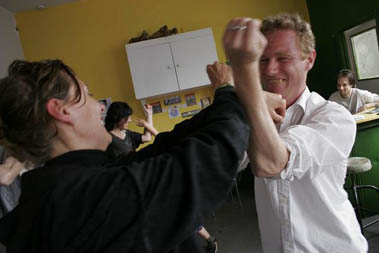|

Theater Of The OppressedTheater is a channel for knowledge; it is the art of looking at our selves and can be a means of transforming society. Brazilian theater activist, Augusto Boal, created Theater of the Oppressed (T.O.) in the 1960's out of a belief that "we can make this world a place where we can be happy in rather than just a vast market place in which we sell our goods and our souls". In Theater of the Oppressed there are no spectators. The fourth wall of traditional theater is abolished and spectators become 'spect-actors'. The spect-actors are the participants in the creation of the drama - it is their conflict, their worlds, and their life experiences that we wish to address. By giving the participants power in the creation of the action, they are being transformed and prepared to participate in the theater of life. Using the various techniques and activities outlined in the Theater of the Oppressed doctrine, spect-actors uncover the root causes of problems and what internal and external factors block them from effective action. They are able to "see" their problem, "analyze" it and "act" to change the situation.
Workshops Offered by the Living Awareness Institute
Image TheaterWords are emptinesses that fill the emptiness (vacuum) that exists between one human being and another. Words are lines that we carve in the sand, sounds that we sculpt in the air. We know the meaning of the word we pronounce, because we fill it with our desires, ideas and feelings, but we don't know how that word is going to be heard by each listener. IMAGE THEATRE is a series of Techniques that allow people to communicate through Images and Spaces, and not through words alone. Augusto Boal, Rio de Janeiro 2004 Image Theater, part of the repertory of Theater of the Oppressed, created
by Brazilian director and cultural activist Augusto Boal as organizing
tools for communities in struggle, is designed to develop individual
skills of observation and self-reflection, and cooperative group
interaction. Leadership- and consensus-building games and techniques, such
as Image of the Word, and Image of Images of Oppression, explore relations
of power and group solutions to concrete problems through "living body
imagery". Discussions begin to take place through the language of images,
offering a fresh approach to power analysis and new opportunities for the
exchange of ideas.
Forum TheaterMusic is the organization of sound in time; plastic arts, the organization of colors and lines in the space; theatre, the organization of human actions in time and space. Theatre is a representation and not a reproduction of social reality. FORUM-THEATRE presents a scene or a play that must necessarily show a situation of oppression that the Protagonist does not know how to fight against, and fails. The spect-actors are invited to replace this Protagonist, and act out - on stage and not from the audience - all possible solutions, ideas, strategies. The other actors improvise the reactions of their characters facing each new intervention, so as to allow a sincere analysis of the real possibilities of using those suggestions in real life. All spect-actors have the same right to intervene and play their ideas. FORUM-THEATRE is a collective rehearsal for reality. The aim of the forum is not to find an ideal solution, but to invent new ways of confronting oppression. In Brazil and other parts of Latin America, as well as in India and Africa, Forum Theater has been used with peasant and worker "audiences" as training in labor and community organizing and participatory democracy. Augusto Boal, Rio de Janeiro 2004 The Rainbow Of DesireRAINBOW OF DESIRE Many concrete oppressions provoke deep damage inside our subjectivity and psychic life. Under the general title of RAINBOW OF DESIRE, there are fifteen Techniques - complex, but not complicated! which help us to visualize theatrically our oppressions, and deal with them more clearly: no one interprets anything, but all participants offer the Protagonist the mirror of the multiple regards of the others. We try to locate the Cops in our Head knowing very well that, if those Cops are there, they have come from some Headquarters outside us that spread them all around, into the heads of many more citizens. We try to discover the ideology of each Cop and not concentrate our attention on the particular individual.
Augusto Boal, Rio de Janeiro 2004
|


